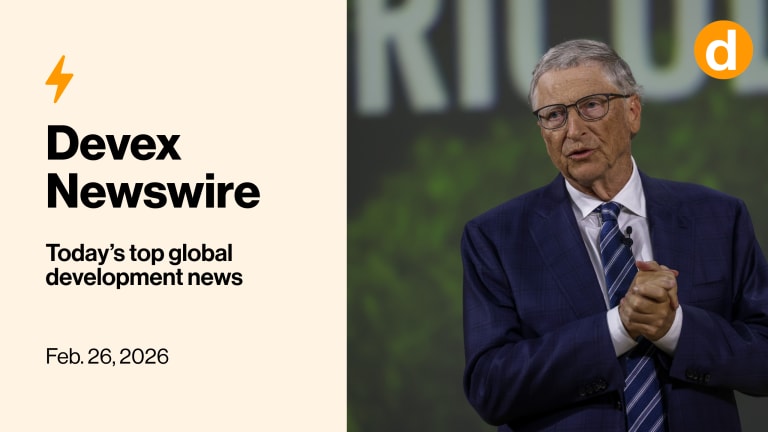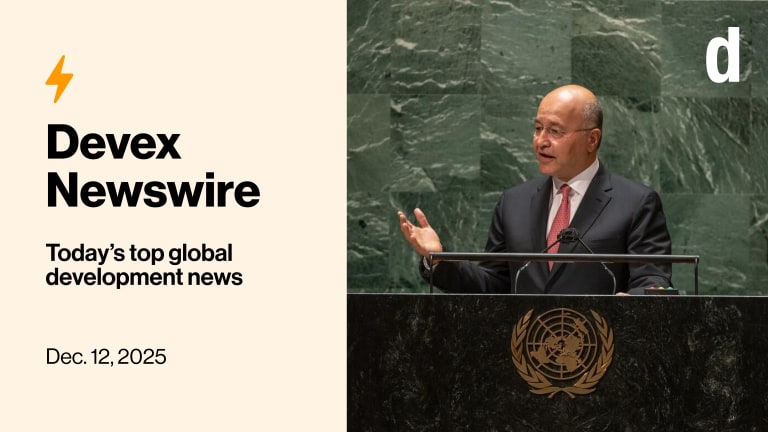Many people have plenty to say about the war between Israel and Hamas, but others are too fearful to say anything, a dynamic that seems to be playing out among philanthropists. Also in today’s edition: The failure to reauthorize the United States’ landmark HIV/AIDS initiative caused an uproar, but is it really the end of the world? Treading very carefully The massacre in Israel and the subsequent bombardment of Gaza have become a cauldron of loss and pain, blame and retribution. The war has also morphed into a personal, professional, and political minefield for people far removed from the violence. While some have been vociferous in supporting or denouncing each side, others have stayed silent for fear of being branded antisemitic, anti-Muslim, too pro-Palestinian, too pro-Israeli, or any of a number of highly charged labels. It’s a dynamic that’s playing out in the world of philanthropy, where donors are struggling to find the right things to say, our Senior Reporter Stephanie Beasley writes. The result is extreme caution or outright silence. Many people within the sector who’ve historically been vocal about equity and human rights issues are horrified by what is happening in Gaza, but aren’t saying anything publicly about the ongoing Israeli airstrikes that have killed more than 8,000 people because they worry they will be labeled antisemitic, one U.S.-based philanthropy leader tells Stephanie. Meanwhile, Jewish philanthropic leaders say their community feels abandoned after 1,400 people in Israel were killed by Hamas militants on Oct. 7. “That I can’t take a position publicly has been frightening in terms of freedom of speech,” a philanthropy leader says. But others say silence is not the answer — action is. “To be honest, my biggest concern is that donors don’t lean in, that they are so concerned over being perceived as on a side or on the wrong side, whichever it may be, that they don’t stand up,” says Patricia McIlreavy, president and CEO of the Center for Disaster Philanthropy, which recently established a relief and recovery fund for Israel and Gaza. The goal, McIlreavy says, is to be an avenue for funders who are more interested in addressing unmet humanitarian needs than the politics of the crisis. Read: Why philanthropy has gone quiet amid the Israel-Hamas war (Pro) + Not a Devex Pro member yet? Access all our exclusive reporting and analysis by starting your 15-day free trial of Pro today PEPFAR panic? The current five-year authorization of PEPFAR expired at the end of the fiscal year on Sept. 30, dealing a huge blow to supporters of the U.S. global HIV/AIDS initiative, which is credited with saving 25 million lives. The logjam occurred after some Republicans accused the Biden administration of co-opting the U.S. President's Emergency Plan For AIDS Relief as part of a liberal social agenda that promotes abortion — ensnaring the initiative into the political culture wars that perpetually bring the U.S. Congress to a standstill. But some PEPFAR proponents are going against the grain and urging calm over panic, pointing out that the program will continue operating. “Just because it hasn't been reauthorized doesn't mean it ends,” Jennifer Kates, director of global health and HIV policy at KFF, said in a webinar. “PEPFAR is a permanent part of U.S. law. As long as it continues to be funded by Congress, it continues.” But that’s not to say there won’t be repercussions, my colleague Michael Igoe writes. Specific policies embedded in the previous authorizing bill did expire, including a key one that governs U.S. funding for the Global Fund to Fight AIDS, Tuberculosis and Malaria, a multilateral organization that works alongside PEPFAR in dozens of countries. Piling onto the pressure, The Washington Post reported that Republicans are preventing PEPFAR from spending more than $1 billion that lawmakers already approved for the initiative. “I would posit that that is a more serious challenge right now than the fact that we passed September 30th without a reauthorization and the fact that we don't have a budget yet,” Kates said. Read: What PEPFAR's political paralysis means for the Global Fund Related read: What ‘extremism’ in US politics means for PEPFAR’s future (Pro) + Check out our page dedicated to the future of U.S. aid. Big bets Listening to South African icon Nelson Mandela in Detroit as a wide-eyed 17-year-old. Treating leprosy patients in rural India. Volunteering on Al Gore’s ultimately doomed U.S. presidential campaign. In the end, it was a role at the then-fledgling Bill & Melinda Gates Foundation that taught Rajiv Shah about the power of big bets, which he defines by their aim of not just improving a problem, but really solving it. Shah, former administrator of USAID and current president of the Rockefeller Foundation, talks about his journey and his new book, “Big Bets: How Large-Scale Change Really Happens,” with Devex Editor-in-Chief Raj Kumar in the latest edition of our book club podcast. Listen: Rajiv Shah on the power of big bets A nonlinear career path Shah says he wrote his book in part to help readers feel empowered to have great careers in development — a guiding mission of Devex as well. In our latest careers event, we help job seekers understand whether a portfolio career — a path that encompasses a variety of job types, contract types, skills, and industries — could be a good fit for them. “We’re not thinking about a career that follows a linear pattern,” Simone Anzböck, an international coach and the founder of Prosper Abroad, tells our Careers Editor Justin Sablich. “The idea of [a] portfolio career goes against so much of what we learn at home, in school, in society — like the idea that we should go through certain life stages.” Watch: How to get started with a portfolio career in global development (Career) + Start your 15-day free trial of a Devex Career Account today to access the piece as well as all our exclusive career events, including an event tomorrow on strategies for mastering your next development job interview. Opinion corner • Migration is a global phenomenon, but to tackle it, funders must invest in solutions at the local level, especially when you consider that in the coming years, 1 in 5 international migrants will move to just 20 cities, write Yousef Al Shawarbeh, Bernhard Straub, and Vittoria Zanuso. • The relatively meager amounts of climate adaptation finance mobilized to date is due in part to the fact that we haven’t truly defined what climate adaptation success looks like, argues Jennifer Denno Cissé. • Former Nigerian President Olusegun Obasanjo warns that the U.K. is threatening India’s ability to supply lifesaving generic medicines to the rest of the world. • Despite producing the majority of the world’s food, many family and smallholder farmers are mired in poverty. Kyrgyzstan offers a lesson in how community-based water management can mean the difference between crop success and failure, write Toolos Bostonbaev and Andita Listyarini. • Competition from Chinese creditor institutions. Rising bailouts from bilateral creditors. Surging Special Drawing Rights lending rates. These challenges mean the International Monetary Fund needs to cap its lending rate temporarily, argues Sander Tordoir. + Want to write an opinion article for Devex? Email us your pitch at editor@devex.com. In other news A summit in Saudi Arabia between warring parties in Sudan will center on ensuring humanitarian aid delivery and brokering a ceasefire rather than addressing political issues. [Barron’s] The World Trade Organization has warned against a “very costly” global economy fragmentation, as well as the impact of the climate crisis and the Israel-Hamas war. [Nikkei Asia] As the situation in Gaza further deteriorates, people have broken into the U.N. Palestinian refugee agency’s warehouses to take basic supplies. [BBC] Sign up to Newswire for an inside look at the biggest stories in global development.
Many people have plenty to say about the war between Israel and Hamas, but others are too fearful to say anything, a dynamic that seems to be playing out among philanthropists.
Also in today’s edition: The failure to reauthorize the United States’ landmark HIV/AIDS initiative caused an uproar, but is it really the end of the world?
The massacre in Israel and the subsequent bombardment of Gaza have become a cauldron of loss and pain, blame and retribution. The war has also morphed into a personal, professional, and political minefield for people far removed from the violence.
Printing articles to share with others is a breach of our terms and conditions and copyright policy. Please use the sharing options on the left side of the article. Devex Pro members may share up to 10 articles per month using the Pro share tool ( ).
Search for articles
Most Read
- 1
- 2
- 3
- 4
- 5








